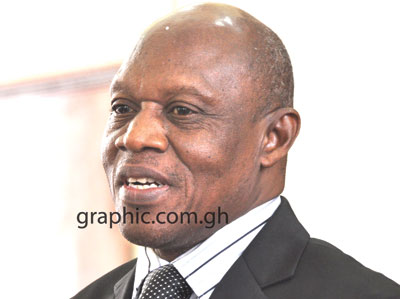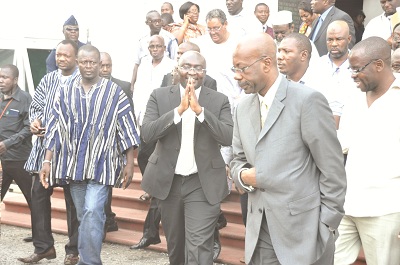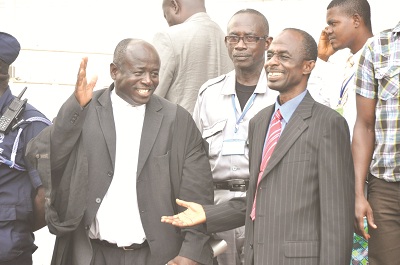Court orders audit of pink sheets
 The Supreme Court, in consultation with parties in the presidential election petition, has appointed KPMG, an international accounting firm, to conduct an audit of the pink sheets that have been filed at the court’s registry as exhibits by the petitioners.
The Supreme Court, in consultation with parties in the presidential election petition, has appointed KPMG, an international accounting firm, to conduct an audit of the pink sheets that have been filed at the court’s registry as exhibits by the petitioners.
Advertisement
As the firm’s terms of reference, the court directed that the audit should be based on the court’s exhibits in the custody of the registrar and in accordance with the category of malpractices alleged by the petitioners, as contained in paragraphs 44 to 67 of the affidavit deposed to by Dr Mahamudu Bawumia, the second petitioner, and dated April 7, 2013.
Furthermore, the exercise should take into account the polling stations involved, their names, code numbers and exhibit numbers, if any.
The President of the court, Mr Justice William Atuguba, announced this yesterday in a ruling on an application for the count at the instance of Mr Tsatsu Tsikata, counsel for the National Democratic Congress (NDC).
According to the court, each of the parties in the petition was at liberty to choose two representatives to observe the exercise and, on completion, a report should be submitted to the registrar.
There was no indication as to when the exercise would commence, but once the order has been given, the exercise will start, provided the necessary paperwork is completed on time.
The petitioners have alleged malpractices covering over-voting, the non-signing of pink sheets by presiding officers or their assistants, voting without biometric verification and duplicated serial numbers of pink sheets.
To them, they investigated the irregularities in 11,842 polling stations and provided the pink sheets involved as exhibits.
However, upon evaluation of their analysis, they now rely on 11,138 of those pink sheets, on which they are seeking the annulment of the results.
The respondents, President John Dramani Mahama, the Electoral Commission (EC) and the NDC, have denied that any such irregularities occurred during the December 7 and 8, 2012 elections.
Continuing his cross-examination of Dr Bawumia, the star witness for the petitioners, yesterday, Mr Tsikata challenged the witness on the exact number of pink sheets that had been exhibited, since, according to him, the 11,842 alleged to have been filed was not correct .
Counsel said the respondents had received only 6,822 of the pink sheets and told Dr Bawumia about the legal consequences regarding the inconsistency in the figures.
The witness replied that the petitioners were relying on figures contained in their affidavit, but Mr Tsikata insisted that the exhibits before the registrar did not amount to 11,842 as claimed by the witness.
Lead counsel for the petitioners, Mr Philip Addison, objected to that line of questioning and stated that if the respondents doubted the figures, they could go to the court’s registry to ascertain that, instead of saying in court that they had not received the exact number of pink sheets alleged to have been filed as exhibits.
Mr Tsikata said there was no need to involve the registrar in the matter, after for which Mr Justice Atuguba asked Mr Tsikata to continue with his cross-examination of the witness.
When counsel asked the witness whether he would agree that they exhibited 6,822 pink sheets, Dr Bawumia replied in the negative.
When the President of the court asked that the issue be abandoned, so that Mr Tsikata continue his cross-examination, counsel replied that the issue was, in fact, about the credibility of the witness because he had not given the correct number of pink sheets in contention.
Counsel argued that it was in the best interest of justice to have the correct number of pink sheets, since that formed the basis of the petition.
He, therefore, applied to the court for a recount of pink sheets exhibited by the petitioners based on paragraph 44-67 of the petitioners’ affidavit in order to know the number which was before the court.
That, he further said, would enable the court to know the number of exhibits filed by petitioners and had been received by the registrar.
Mr Tsikata said he did not wish to defer his cross-examination of the witness and that the exercise could go on so that the second leg of the exercise would be done during the break.
Counsel for the President, Mr Lithur, said the second part of the request made by Mr Tsikata was very important, especially when the petitioners alleged 11,842 pink sheets in their affidavit but the President had received 6,822.
He said if after the recount the figure was not what was being alleged to have been filed, he would have to cross-examine the witness again on those documents that had not been received by him.
Mr Addison replied that the respondents must be held responsible for not finding out from the registrar the number of exhibits filed by the petitioners because the petitioners had done their part.
Mr Lithur responded that the number of exhibits filed by the respondents was contained in the affidavit deposed to by Mr Johnson Asiedu Nketiah, General Secretary of the NDC, and which was before the court.
The petitioners, he said, had not been consistent with the figures.
Mr Tsikata again said counsel for the petitioners could not disable respondents from checking from the registrar the number of exhibits filed by the petitioners.
Counsel for the EC, Mr James Quashie-Idun, supported the application and indicated that in the interest of justice all the parties must know the number of exhibits in issue, to which Mr Addison retorted that the counting could be done there and then.

According to Mr Addison, the application was not about any ordinary counting but an independent verification, since the petitioners kept insisting that they had 11,842 exhibits.
When the bench asked the respondents how many exhibits were in issue, Mr Tsikata replied that it would be premature to disclose the number in the presence of the witness.
Counsel said the nature of the application was to get to the bottom of the issue because the witness had not been consistent with it.
Mr Justice Jones Victor Dotse asked whether the application was based on the tallying of the figures on the pink sheets and whether the respondents had been supplied with all the exhibits, but Mr Tsikata said that was an intermediary issue.
According Mr Tsikata, the respondents ought to know whether the registrar had received all the exhibits that the petitioners were alleged to have filed.
When the parties were waiting for the bench to sit after the break, the registrar, at exactly 2:13 p.m., called all the counsel in the matter to meet the judges in chambers and after deliberating for a little over an hour, counsel returned to the courtroom.
When the court resumed sitting, Mr Tsikata asked some questions relating to duplicated serial numbers and pointed out that he had a large number of pink sheets which the witness had to answer questions on.
In the cross-examination that preceded the arguments before the lunch break, Mr Tsikata had confronted the witness with questions that related to Paragraph 48 of the petitioners’ affidavit that combined irregularities which allegedly took place in 20 polling stations.
Dr Bawumia replied that it was correct but they had since changed that to the over-voting category.
The questions then dwelt on pink sheets that had not been signed by presiding officers but had names, dates and time of voting on them.
When Dr Bawumia refreshed his memory with some documents without leave from the court, his attention was drawn to that by Mr Tsikata, who said the witness could not do that since the document was not part of the further and better particulars.
“The question that I asked is based on the face of the pink sheet so I do not see why you need to refresh your memory in order to identify signatures,” he told the witness.
Mr Addison objected to the line of questioning and said Mr Tsikata was doing what the court had ruled should not be done and that counsel should restrict himself to composite questions.
In reaction, Mr Tsikata said the ruling on asking composite questions related to the identification of pink sheets and since they had been given new sets of pink sheets, which were unique in themselves, he should be allowed to ask questions on them.
Ms Justice Rose Owusu said the issue being raised related to pink sheets without the signatures of presiding officers, but Mr Tsikata replied that that was important, considering the fact that the petitioners claimed that the absence of signatures was enough reason to annul the results.
When Ms Justice Owusu said that was a matter for the court to decide, Mr Tsikata replied that since the fact had to be established, his cross-examination was seeking to do that.
“So what do we do with the dates and times on the pink sheets?’’ Ms Justice Owusu asked Mr Tsikata, who said because the election was held on a date, the time was of essence and he should, therefore, be allowed to go ahead with the cross-examination.
When Ms Justice Sophia Adinyira also reminded counsel that Mr Addison’s intervention related to the same questions being asked again, Mr Tsikata said it was really not feasible to do it that way, since each of the pink sheets was different.
Hearing continues on Monday.



